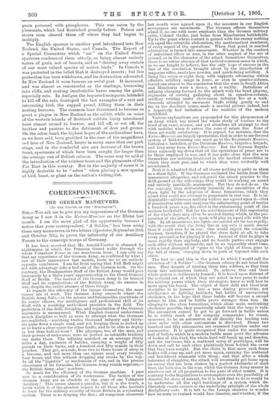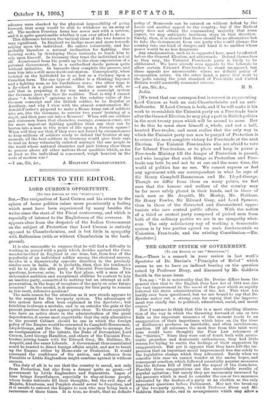THE GERMAN MANCEUVRES.
[TO THE EDITOR OF TIIE " SPECTATOR:1
SIR,—You ask me to give you my impressions of the German Army as I saw it in the Kaiser-Maniiver on the Rhine last month. I am the more glad of the opportunity because I notice that your correspondent, "A Soldier," has been using these very manceuvres, in two letters (Spectator, September 30th and October 7th), to prove the inferiority of our Auxiliary
Forces to the conscript troops of Germany.
It has been asserted that Mr. Arnold-Forster is obsessed by nightmares in which the Prussian Guard walks through the whole Volunteer Force in one murderous hour. I can only say that my experience of the German Army, as confirmed by what I saw at their manceuvres last month, leads me to an entirely opposite conclusion. I am far from saying that Pall Mall might not with advantage take a leaf out of the German book. On the contrary, the Headquarters Staff of the British Army would gain immensely by a three years' apprenticeship to the Great General Staff at Berlin. The marvel of the German Army is its trained Staff and its organisation ; of the British Army, its success in war, despite the entire absence of these things. As regards the efficiency of the troops themselves, the same causes are at work. The German Army succeeds where the British Army fails,—in the science and businesslike exactitude of its senior officers, the intelligence and professional skill of its Staff, with a resulting methodical precision in the field. The perfection of the drill, discipline, and organisation of the German regiments is unsurpassed. What English General understands march discipline so well as even to attempt what the Germans accomplished,—marching twelve thousand infantry and thirty- six guns down a single road, and yet keeping them so locked up as to leave a clear space for other traffic, and to be able to deploy in less than half-an-hour ? The physique, too, of the men, and their powers of endurance, were as perfect as scientific training can make them. The infantry marched on an average thirty miles a day, exclusive of battles, carrying a weight of fifty pounds on their backs, and a hundred and fifty rounds in their pouches. They got, as a rule, from two to three hours of sleep in a, bivouac, and not more than one square meal every twenty- four hours, and this without dropping any crocks by the way. In all the "logistics" or mechanism of war, and in the precise observance of its formulae, the German Army stands supreme,— the British Army, alas ! nowhere.
So much for the efficiency of the German machine. I pass now to a consideration of its weaknesses. The tactics of the German Army are as obsolete as the guns of our Volunteer Artillery ! This seems almost a paradox, but it is the truth, a truth which is of the greatest import to all those who hesitate to trust for the military security of Great Britain in a voluntary system. There is no denying the fact ; all competent observers critic, Colonel Gfidke, just home from Manchurian battlefields. Hp to the point where contact is gained with the enemy nothing can equal the scientific elaboration, the mathematical exactness, of every aspect of the operations. When that point is reached admiration is turned into amazement. Whether in the conduct of individual officer or man, in the utter neglect of the use of ground, or in the character of the attack formations themselves, there is an entire absence of that tactical common-sense in which, as we are taught to believe, lies the only hope of success in the face of the revolution brought about by the introduction of magazine rifles, smokeless powder, and quick-firing artillery. A firing line seven or eight deep, with supports advancing within effective artillery range in fours, or even in quarter-column,
forced one almost to the conclusion that the wars in South Africa and Manchuria were a dream, not a reality. Battalions of
infantry charging forward to the attack with the band playing,
regiments of cavalry galloping about in squadron-column, artillery retiring under close-range infantry fire at a walk, Generals attended by enormous Staffs riding gently to and fro in the deadliest zones, made a martial picture indeed, but a hopelessly bad imitation of the realities of the modern battlefield.
Various explanations are propounded for this phenomenon of an Army which has raised the whole study of warfare to the level of an exact science, and yet abandons all attempt to deal with realities when it enters the zone of mimic fire. None of them are really satisfactory. It is argued, for instance, that the
Kaiser-Hanover are largely spectacular, that in order to see the real system of field-training one must go to the Regiments Hanover, battalion -v. battalion, or the Divisions Hanover, brigade v. brigade, and keep away from Kaiser-ManOver. But the German Regula-
tions expressly lay down that all the operations of peace are to be those employed in war, and it was quite clear that the men themselves saw nothing irrational in the tactical absurdities in which they took part, and to which they were evidently well accustomed.
Next it is admitted that of all shams nothing is quite so sham as a sham fight. If the Germans excluded the battle from their manceuvres altogether, and relegated the attack practice to the drill-ground or the rifle-range, they would be working on sound and entirely justifiable arguments. But they do not so. On the contrary, they deliberately intensify the unrealities of the sham fight by the adoption of dense formations, which they admit they could not attempt to perpetuate in real war. It is in- disputable—all German military writers are agreed upon it—that if penetration with cold steelmas the culminating point of tactics a hundred years ago, fire effect is the culminating point of the modern battlefield. But for the establishment of this superiority of fire whole days may often be needed during which, in the pre- paration of the attack, the spade will play an equal role with the rifle. In all mauceuvres the fights are carried out far too rapidly, with the result that the firing line at any rate is much denser than it could ever be in war. One would expect the scientific German, therefore, if he played the sham fight at all, to take every precaution for playing it slow. Instead of that he plays it more rapidly than anybody, and no hostile parties ever engage each other without ultimately, and in an impossibly short time, with a total disregard of "guns to the right of them, guns to the left of them," charging down to push of bayonet with each other.
The fact is—and this is the point to which I would call the attention of "A Soldier "—the German officers do not trust their
men. They despair of turning them into soldiers, so they turn them into automatons instead. To achieve this end their whole system is deliberately framed ; it is based upon distrust of the material out of which they are asked in two years to make the military pawns which their strategists know so well how to move upon the board. The object of their drill and their iron discipline is to hammer into a man during peace-time, not intelligence or fighting instincts, but habits of unreasoning obedience, in the hope that these habits will become a second nature to him, and in battle prove stronger than fear. By clinging to the close formations, which alone make unthinking obedience possible, they practically admit that the hope is vain. The automaton cannot be got to go forward in battle unless he is within reach of his company commander ; he ceases, moreover, to be an automaton at all directly the herding into close order with other automatons is dissolved. Hence two hundred and fifty automatons are crammed together under one commander. It is quite recognised that under the murderous hail of bullets which in a modern battle must greet the advance of bodies of this kind, the whole herd will break up and dissolve, and the survivors, like a scattered covey of partridges, will lie down and call to each other plaintively from behind the cover' that they have sought. But the Claim is that more such dense bodies will come up, and yet more again, carrying the scattered and bewildered remnants with them ; and that after a whole holocaust of slaughter, the attack will eventually get home upon an enemy that has been shaken by a perfect avalanche of shell from the batteries in the rear, which the German Army masses in numbers out of all proportion to the guns of other armies. It is contrary to the Regulations to contemplate even the possibility of disaster, let alone of retreat, for it is held that to do so would be to undermine all the rigid teachings of a system which de- liberately exacts success as the underlying principle of the whole disciplinary code. It is left to the foreign observer to wonder how an army so trained would face disaster, and whether, if the advance were checked by the physical impossibility of going forward, that army would be able to withdraw as an army at all. The modern Prussian Army has never met with a reverse, and it is quite questionable whether it can ever afford to do so. This difference between the tactical ideas of the two Armies is very significant. In England we incline more and more towards relying upon the individual. He enlists voluntarily, and has probably therefore a natural inclination for fighting. Our training seeks, by developing these instincts, to teach him to rely upon himself. In Germany they trust the individual not at all. Accustomed from his youth up to the close supervision of a paternal Government, he is a methodical docile person quite without initiative. In barracks they complete the process, and turn him into a still more docile automaton. Consequently, when isolated on the battlefield he is as lost as a Cockney upon a Canadian farm. The one type of soldier is a thinking bayonet and a fighting man, as his forefathers were; the other type is a fly-wheel in a great machine. But the metal is soft, so soft that in preparing it for war under a conscript system the Germans dare not face its realities. That is why I cannot share "A Soldier's" opinions as to the relative value of the German conscript and the British soldier, be he Regular or Auxiliary, and why I view with the utmost consternation Mr. Arnold-Forster's proposal to make a Home Army out of soldiers who are, like the Germans, to receive two years' training at a depot, and then pass out into a Reserve ! When will our soldiers and statesmen learn that character, courage, common-sense, are far more important fighting qualities than any that can be beaten into a man in two years of life upon a barrack square ? When will they see that, if they were not forced by circumstances to keep millions of soldiers ready to defend the frontier at any moment, all the best soldiers in Germany would give their ears to lead an Army voluntarily enlisted amongst the one people in the world whose national character and past history show them to possess above all other nations those qualities which, as far at least as the individual is concerned, weigh heaviest in the scale of modern war ?
—I am, Sir, &c., A MILITARY CORRESPONDENT.















































 Previous page
Previous page